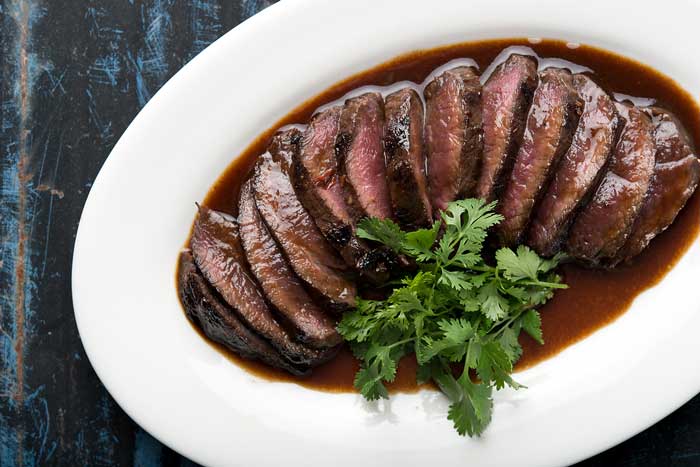8 Best Venison Marinades

Print RecipePerhaps the most common question I get about cooking venison is what marinades I use the most. The truth is, I don’t always use a marinade, because a really good piece of backstrap needs little more than salt and black pepper. But there is definitely a place for marinades in venison cookery. The real trick is knowing when to break out your favorite marinade…and when it’s best to make it into a sauce you serve at the end.
Why marinate?
Marinades are acid-based liquids or loose pastes used to infuse meat or veggies with flavor, while at the same time tenderizing them. At least that’s the theory.
Bathing venison – or any other meat, for that matter – in an acidic sauce or fruit juice like those found in papaya or pineapple will break down some of the muscle tissue on the outer surface of the meat. The acidic enzymes denature the proteins in the meat, which makes it mushy and gives the sensation of tenderness. You should know, however, that marinades cannot penetrate meats the same way salt-based brines do. According to most food scientists, a marinade cannot penetrate much deeper than 1/8 inch into a piece of meat per day.
But that can be enough to give you an edge when cooking tougher venison cuts like leg steaks or kebabs. Backstrap usually only needs a marinade when it came from an old animal – especially a rutting buck – and you should marinate a tenderloin only in special circumstances. Typically, a tenderloin is so tender (hence its name) you can grill or sear it without any extra help.
Marinades also impart flavor into the meat, although it will never penetrate to the center of a thick cut like a roast. Even an hour’s worth of marinating time will give you some added flavor in the finished dish.
Most importantly, marinating meat in an acidic sauce for at least 40 minutes has been shown by the American Cancer Society to reduce the amount of cancer-causing heterocyclic amines by up to 99 percent. These cancer-causing compounds are produced when meat is cooked over a direct, open flame like a grill. This means a marinade not only improves flavor, but can also make your char-grilled piece of venison healthier.
Choosing the Right Cuts to Marinate
Because marinades can at best only penetrate 1/8 inch into a piece of meat each day, you’ll want to use cuts of venison that aren’t too thick. This means you’ll typically use a marinade with cuts like backstrap medallions from large deer, elk or moose, all leg steaks, flank steak and cubed steak for kebabs.
Keep in mind, the one thing a marinade will not do is tenderize silverskin and connective tissue. You absolutely must trim all this tissue off before marinating, because it will not tenderize and the silverskin will actually block the penetration of an acidic marinade.
A Few Simple Steps
You want to marinate your venison in a sealable plastic bag or in a covered, non-reactive container such as glass or plastic. Do this in the fridge to slow the growth of any bacteria. As a quick tip for stir-fries and fajitas, marinate the venison slices before you stir-fry them. When you do it this way, you get more flavor.
When you are ready to cook, take the meat out of the marinade and pat it dry with paper towels. The reason you dry the meat is because wet venison won’t brown properly.
If you want to use your marinade as a sauce, you can do one of two things: First, boil your marinade for 5 minutes before using it; or, second, if this will destroy your marinade (the chimichurri recipe below is an example of this), make more than you need for the marinade and use the extra as a sauce. Do not just use the marinade raw: There is a chance, albeit small, that you could get food poisoning.
Here are eight of my favorite marinades – most double as sauces, too – for your next venison cookout.
Italian Dressing
Yup, this is the tried and true ol’ classic. It may be considered low-brow by some, but it works. The dressing has the right balance of vinegar, oil and herbs to improve the flavor of most meats. If you want to make your own, put the following in a Mason jar:
- ¼ cup vinegar (red wine, cider, white wine, etc)
- ¾ cup olive oil
- 1 teaspoon mustard
- 1 garlic clove, mashed and minced
- 1 tablespoon Italian seasoning (or oregano)
Put the lid on the jar and shake it for all you’re worth, which will emulsify the marinade. You can also just whisk it together in a bowl.
Teriyaki
Teriyaki marinades are almost as classic as Italian dressing. And yes, you can use store-bought teriyaki sauces, but I find them too sweet and not quite right. This is especially true if you’ve ever had real Japanese teriyaki. Here’s how to make it yourself: First, mix all the following ingredients together before marinating.
- 1/2 cup sake
- 1/2 cup mirin, a Japanese sweet wine
- 6 tablespoons soy sauce
- 1 heaping tablespoon sugar
South Carolina BBQ
My favorite BBQ sauce comes from South Carolina. It’s a yellow, mustard-based sauce that is made of 100 percent awesome. Even if you are a partisan of other styles of barbecue, give this one a go. You might be surprised.
- 4 tablespoons butter
- 1/2 onion, grated
- 1/2 cup yellow mustard (the kind you get at the ballpark)
- 1/2 cup brown sugar
- 1/2 cup cider vinegar
- 1 tablespoon dry mustard (like Coleman’s)
- 2 teaspoons cayenne
- Salt to taste
Cook the grated onion in the butter over medium heat until soft, but not browned. Add the remaining ingredients, bring to a simmer and cook gently for 15 minutes. Let it cool before using as a marinade.
Kansas City BBQ
For the traditionalists out there, here’s the barbecue sauce for you.
- 5 tablespoons butter
- 1/2 medium onion, finely chopped
- 4 finely chopped garlic cloves
- 2 cups tomato sauce or ketchup
- 1/2 cup apple juice
- 1/2 cup apple cider vinegar
- 1/2 cup brown sugar
- 3 tablespoons paprika
- 2 tablespoons chili powder
- Salt to taste
- Cayenne to taste
Cook the grated onion in the butter over medium heat until soft, but not browned. Add the garlic and cook another minute or two, then add the remaining ingredients, bring to a simmer and cook gently for 15 minutes. Let it cool before using as a marinade.
Greek style
I love this one in the summertime, especially for kebabs. It’s a variant of Italian dressing, as you might expect from the country just to the east of Italy. Mix together:
- ¼ cup lemon juice
- ¾ cup olive oil
- 1 teaspoon salt
- 1 teaspoon black pepper
- 1 heaping tablespoon dried oregano
- Grated zest of a lemon
Tex Mex
This one’s a classic, too, especially with chicken (or pheasant), but it’s also great with venison. Mix:
- 1 shot of tequila
- ¼ cup lime juice
- ¾ cup olive oil
- 1 teaspoon salt
- 1 teaspoon black pepper
- ¼ teaspoon ground cumin
- ½ cup chopped cilantro
- 1 minced Serrano chile
- 1 chopped green onion
- Zest of a lime
Korean Bulgogi
This might be my favorite marinade of them all. I grew up with this one, which my mom used to marinate flank steak in a version of this sauce. It’s sweet, savory and sour all at the same time. Mix the following in a large bowl:
- 4 green onions, chopped
- 2 tablespoons grated ginger
- 4 cloves of garlic, mashed and chopped
- 2 tablespoons toasted sesame seeds
- 2 tablespoons sesame oil
- 3 tablespoons sugar
- 2 hot chiles, minced
- 1 tablespoon molasses or Asian plum sauce
- 1/4 cup mirin, rice wine or lemon juice
- 1/3 cup soy sauce
Chimichurri
This is basically Argentine ketchup: They put this stuff on everything. It’s an herby, slightly zippy sauce that, when you add a little red wine vinegar, makes a great marinade. If you use this one as a sauce, too, you will need to make a second batch – you can’t cook this one. Mix the following together:
- 2 garlic cloves, minced
- 1 cup fresh chopped parsley, lightly packed
- 1 cup fresh chopped mint, lightly packed
- 1 small hot chile, minced
- 3 tablespoons lime juice
- 1/2 cup olive oil
- Salt and black pepper to taste
If you do make a second batch of this for sauce, don’t add the lime juice until you serve. This will keep the herbs all bright and pretty.
You may also like
-
Another Democrat Gun Grabber Calls for Political Violence, This Time with ‘Actual Weapons
-
Dark Web of Taxpayer’s Money Funds Anti-Gun Organization
-
Selected Bill Peroutke for their 2025 Life Membership Award.
-
THANK YOU DEAN FOR ALL YOU DO FOR MANITOWOC COUNTY FISH & GAME
-
Those tragically taken far too soon were brave service members and the dedicated outfitters and hunters from Kansas.
